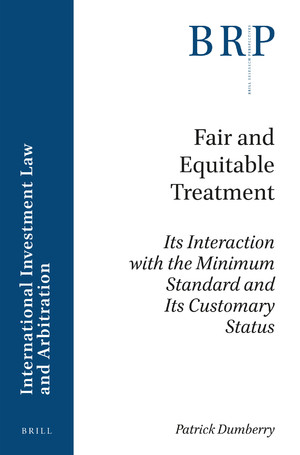Fair and Equitable Treatment

In his latest book, Fair and Equitable Treatment,1[i] Patrick Dumberry, Fair and Equitable Treatment: Its Interaction with the Minimum Standard and Its Customary Status 3 (Ian A. Laird et al. eds., 2018).1 prolific commentator Patrick Dumberry offers a fresh perspective on an oft-debated issue — namely, the contents of the “fair and equitable treatment” standard (“FET standard”).
The book does not attempt to tackle this issue directly (as Dumberry himself makes clear in his introduction).2Id.2 Instead, as Dumberry states, his aim was to try to shed light on a recurring legal question that could bear upon the issue.
As Dumberry explains, various parties and scholars have argued that the FET standard either is (1) equivalent to an existing customary international law concept (viz., the “minimum standard of treatment”), or (2) a standalone rule of customary international law. In his book, Dumberry puts these arguments to the test, examining them against the rubric of modern history.
The book begins by recounting the history of the minimum standard of treatment (“MST”) — from its “emergence . . . in the early 20th century,” to its recognition as a “rule of custom,”3Id.3 and, eventually, to its near demise4ITA in Review Footnotes4 in the 1960s and 1970s, when “a growing number of ‘Newly Independent States’ who were emerging from colonialism” began to challenge “the legitimacy of existing customary international law.”5Id. at 15 (original emphasis omitted).5 According to Dumberry, these challenges are what prompted States to “beg[i]n including the term FET in their BITs.”6Id. at 23.6
After setting out this history, Dumberry then considers its implications on the hotly-debated question of whether “FET should be considered as an independent treaty standard, having an autonomous meaning from the MST.”7Id. at 28.7 In Chapter 1, Dumberry argues that, because FET emerged as an alternative to the MST, it should be treated as such “when the [FET] clause is unqualified and contains no reference whatsoever to international law.”8Id.8 Following this discussion, Dumberry turns in Chapter 2 to an analysis of a “related (but distinct) issue: whether or not the FET standard should be considered in and of itself as a rule of customary international law.”9Id. at 48.9 In this chapter — which is also the last chapter — Dumberry takes the position “that the FET standard has not become a customary rule.”10Id. at 49 (emphasis in original). 10
The book is relatively short, but is an interesting read — and a thoughtful contribution to the scholarship in this area.

